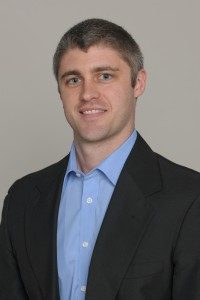Jacob McPherson, Ph.D., assistant professor in Florida International University’s Biomedical Engineering Department, received an Interdisciplinary Rehabilitation Engineering Research Career Development grant through the Eunice Kennedy Shriver National Institute of Child Health and Human Development of the National Institutes of Health (NIH). The grant is entitled “Spinal stimulation for neuropathic pain,” and will aid his research that focuses on individuals with neuropathic pain following spinal cord injury.
Neuropathic pain resulting from spinal cord injury (SCI) impacts up to 80% of individuals with SCI. Physical disabilities are made worse by SCI-related neuropathic pain, which limits or even prevents participation in physical therapy and reduces overall activity level. In addition to the psychosocial burden this places on individuals, the consequences of limited physical activity for the SCI population are severe. Pressure ulcers, cardiovascular decline, and metabolic changes are all leading causes of morbidity post-SCI that arise from limited activity. Unfortunately, therapies for SCI-related pain rarely afford satisfactory relief, and often rely heavily on opioids.
Excessive activation of neurons that process pain-related sensory information is a key component of SCI-related neuropathic pain, even when no painful stimuli are present. For example, in some people simply the touch of clothing against the skin can evoke sensations of burning or pins and needles. Electrical stimulation of the spinal cord is a promising new approach for relief, but the efficacy of current stimulators is limited and the beneficial effects tend to diminish rapidly once stimulation is removed. McPherson and his research team hypothesize that it may be possible to reduce the excessive neural activity that drives SCI-related neuropathic pain by using a novel neural-computer interface to precisely regulate the timing of this activity, effectively ‘retraining’ the nervous system to become less responsive to the false triggers.
By receiving the grant, McPherson and his research will benefit from research funds, salary support, scientific/professional develop mentorship, and clinical training. Dr. McPherson’s research and professional development mentors are Dr. Ranu Jung, PhD, Interim Dean of the College of Engineering and Computing and Wallace H. Coulter Eminent Scholars Chair of Biomedical Engineering at FIU, and Dr. Monica Perez, PT, PhD, Associate Professor of Neurological Surgery at the University of Miami Miller School of Medicine.

